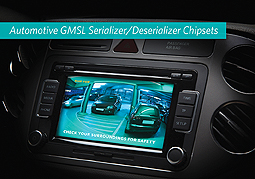Engineers can now design high-resolution advanced driver assistance systems (ADAS) with either traditional STP or lighter, less expensive coax cables using new Gigabit

Multimedia Serial Link (GMSL) SerDes chipsets from Maxim Integrated Products, Inc.
Current vehicle designs use STP cables to drive data to automotive infotainment displays and cameras. However, OEMs are beginning to turn to coax cabling instead, as it lowers cable cost and weight by up to 50%. With Maxim’s SerDes chipsets, OEMs can continue using STP cables in their designs, and seamlessly transition to coax cabling in future models using the same chipset. The chipsets drive 15 meters of coax or STP cabling, providing the margin required for robust and versatile designs. The spread-spectrum capability built into each serializer and deserializer improves EMI performance in the link, without the need for an external spread-spectrum clock. Each serializer can operate with any deserializer in the family, allowing the use of dif ferent interfaces at each end of the link. In addition to driving ADAS applications, these chipsets can also be used in high-resolution central- and rear-seat displays.
Key Advantages
• Reduced cable cost and weight: each SerDes chipset allows the use of coax cables, which reduce cable cost and weight each by up to 50%.
• High-resolution displays: drive 1920×720 pixel displays with 24-bit color, enhancing visuals in both safety and entertainment applications.
• Longer cable lengths: the robust chipsets drive 15 meters of cable, up to 50% longer than competitive solutions.
• Minimized EMI: the serializer has spread-spectrum capability, reducing EMI without additional components.
Maxim Integrated
www.maximintegrated.com


